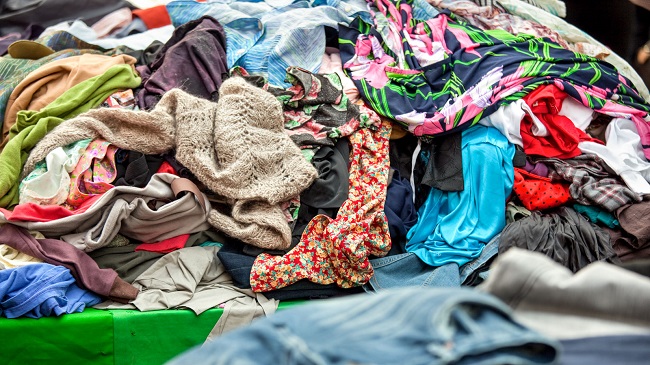The Lagos Waste Management Authority (LAWMA) says it is taking steps to tackle the environmental impact of 1,040 tonnes of textile waste generated daily in the state.

Managing Director of LAWMA, Dr Muyiwa Gbadegesin, said this in a statement on Monday, March 31, 2025, in Lagos to mark the International Zero Waste Day.
Theme of the Zero Waste Day is: “Towards zero waste in fashion and textiles.”
Textile waste refers to any discarded clothing, fabric, or related material that is no longer in use or considered unusable.
Gbadegesin said LAWMA would be taking decisive steps to address the environmental impact of textile waste in line with this year’s theme.
“Textile waste constituted approximately eight per cent of the 13,000 tonnes of waste generated daily in Lagos.
“LAWMA plans to ban textile waste from all landfills in the state. We will be collaborating with Tejuosho Market in Yaba to collect textile waste for transfer to recycling companies.
According to him, students at the LAWMA Academy are being trained to upcycle textile waste into practical products, promoting sustainable practices and creating economic opportunities for residents.
He reiterated its commitment to achieving zero waste in Lagos State, aligning with global efforts at minimising waste generation and maximising resource recovery.
Gbadegesin said the event underscored the urgent need for sustainable waste management practices.
He noted that LAWMA had continued to implement innovative strategies aimed at reducing landfill dependence, increasing recycling rates, and promoting responsible waste disposal among residents.
“The International Zero Waste Day reminds us of our collective responsibility to protect the environment by adopting sustainable waste management practices.
“At LAWMA, we are fully committed to implementing policies and programmes that support zero waste principles, including waste sorting, recycling, and waste-to-energy initiatives.
“However, for these efforts to be successful, every Lagosian must take ownership of their role in ensuring proper waste disposal and environmental responsibility,” Gbadegesin said.
He highlighted some of LAWMA’s key initiatives in its zero-waste efforts to include the expansion of the Lagos recycle initiative, the promotion of circular economy practices, and enhanced enforcement of environmental laws.
“Over the years, we have intensified our recycling programmes to ensure that a significant portion of waste generated in Lagos is diverted from landfills.
“Through our partnerships with recycling firms and the implementation of the ‘Adopt-a-Bin’ programme, we are actively encouraging waste sorting and promoting a culture of recycling among households and businesses,” Gbadegesin said.
He said the authority had continued to expand its Waste-to-Wealth programmes, where organic waste was converted into compost and other useful by-products.
He stressed that LAWMA would continue to promote waste recycling to ensure that more waste materials are repurposed, thereby creating economic opportunities for residents.
“We have seen remarkable progress in our waste conversion efforts. Organic waste, which forms a significant percentage of our total waste, is being processed into compost for agricultural use.
“Similarly, our collaborations with the private sector have facilitated the recycling of plastic waste, aluminum cans, and glass materials, further strengthening the circular economy in Lagos,” he added.
Gbadegesin said the authority’s marine waste team had intensified efforts to clear waste from Lagos’ waterways.
He said that there is an ongoing cleanup operation along the coastline and drainage channels, particularly at Five Cowries Creek and other flood-prone areas.
Reaffirming LAWMA’s zero-tolerance policy on environmental infractions, he urged Lagosians to support the state’s zero-waste vision by complying with waste management laws, embracing recycling, and ensuring proper waste disposal through assigned PSP operators.
Gbadegesin added that community participation remained a key factor in sustaining a cleaner and healthier Lagos.
By Fabian Ekeruche
